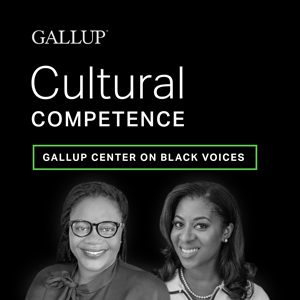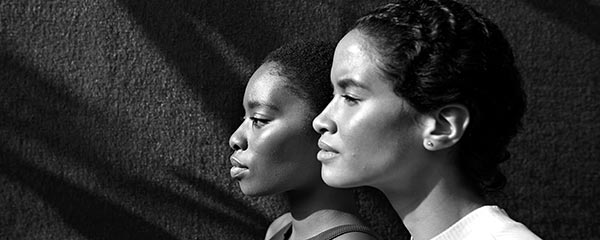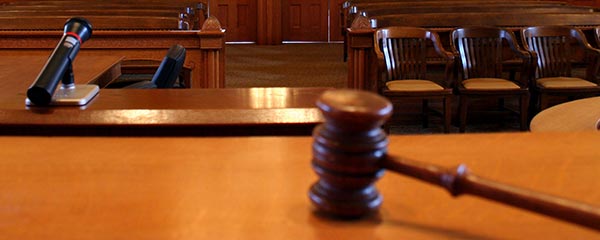Gallup Center on Black Voices
Explore Gallup's independent research that reveals the trends and insights on the experiences of Black Americans.
Gallup’s Latest Insights on Black America
Racial Divide on Policing Narrows 5 Years After Floyd Death
Most Black Parents Discuss Racial Challenges With Children
Gallup Findings Throughout Black History
Gallup has polled on Black issues since the 1930s, including on key turning points in U.S. Black History.
1939
1939
Gallup Polls Its First Question About Racism
In 1939, Gallup asked the first question it ever polled on an issue related to race or racism. First lady Eleanor Roosevelt resigned from the Daughters of the American Revolution (DAR) in protest of the organization's denying a popular Black singer, Marian Anderson, from performing in a DAR concert hall. Most Americans approved of the first lady's protest. View related content about how Gallup Polls Its First Question About Racism.
The Daughters of the American Revolution would not allow a well-known Negro singer to give a concert in one of their halls. As a protest against this, Mrs. (Eleanor) Roosevelt resigned from the organization. Do you approve of her action?
1955
1955
After Rosa Parks' Protest, the Public Opposes Transit Segregation
Rosa Parks' refusal to give up her bus seat for a White man in 1955 sparked a renewed resistance to segregation in U.S. public transit. The U.S. Supreme Court's Browder v. Gayle decision in 1957 struck a major blow to "separate but equal" policies in the South. Gallup found that six in 10 Americans supported the Supreme Court's ruling -- despite strong opposition in the South. View related content about how After Rosa Parks' Protest, the Public Opposes Transit Segregation.
The Supreme Court has also ruled that racial segregation on trains, buses and in public waiting rooms must end. Do you approve or disapprove of this ruling?
1957
1957
Brown v. Board of Education Decision Tested by The Little Rock Nine
In 1954, U.S. Supreme Court's unanimous Brown v. Board of Education decision that racial segregation in public schools was unconstitutional had the support of most Americans (55%). But Gallup also found that a majority of White people would object to sending their children to a majority-Black school at the time.
In a test of the ruling, a group of Black students named "The Little Rock Nine" enrolled at an all-White Arkansas high school, sparking outrage among local White people and prompting the governor to order the National Guard to block the Black students' entry. The American public was mixed on the governor's action (42% said he did the "right thing" while 47% said he did the "wrong thing"), but a small majority (51%) believed The Little Rock Nine should be admitted to the school. View related content about how Brown v. Board of Education Decision Tested by The Little Rock Nine.
1963
1963
Dr. Martin Luther King Jr. Delivers 'I Have a Dream' Speech Despite Dismal Outlook on Race Relations
Americans in 1963 had a grim outlook for the state of race relations to come: 63% believed that relations between Black and White people would get "worse." Despite this outlook, Martin Luther King Jr.'s "I Have a Dream" speech during the March on Washington set a tone of hope for the civil rights movement's course moving forward. View related content about Dr. Martin Luther King Jr. Delivers 'I Have a Dream' Speech.
Do you think relations between the Negro and white races will get better or worse during the next six months?
1964
1964
Public Support for the Watershed Civil Rights Act
The Civil Rights Act of 1964 was the final death knell to segregation in public places in the U.S. About six in 10 Americans approved of the legislation, though most (62%) supported a gradual approach rather than a strict enforcement from the beginning. View related content about Public Support for the Watershed Civil Rights Act.
As you know, a civil rights law was recently passed by Congress and signed by the President. In general, do you approve or disapprove of this law?
1965
1965
Strong Support for the Voting Rights Act -- but Not Among White Southerners
The Voting Rights Act of 1965 was signed by President Lyndon B. Johnson to address the barriers to voting that were in place for many Black Americans. A Gallup poll taken months prior to its passage found that the legislation was favored by more than three in four Americans (76%) -- though by less than half of White Southerners (49%). View related content about Strong Support for the Voting Rights Act.
1967
1967
Strong Disapproval of Interracial Marriage Despite Monumental Loving v. Virginia Decision
The Supreme Court's decision in Loving v. Virginia struck down all state laws that banned interracial marriage, even as Gallup found strong disapproval of interracial marriages. It wasn't until the 1990s that a majority of Americans approved of marriages between Black and White adults. View related content about Strong Disapproval of Interracial Marriage.
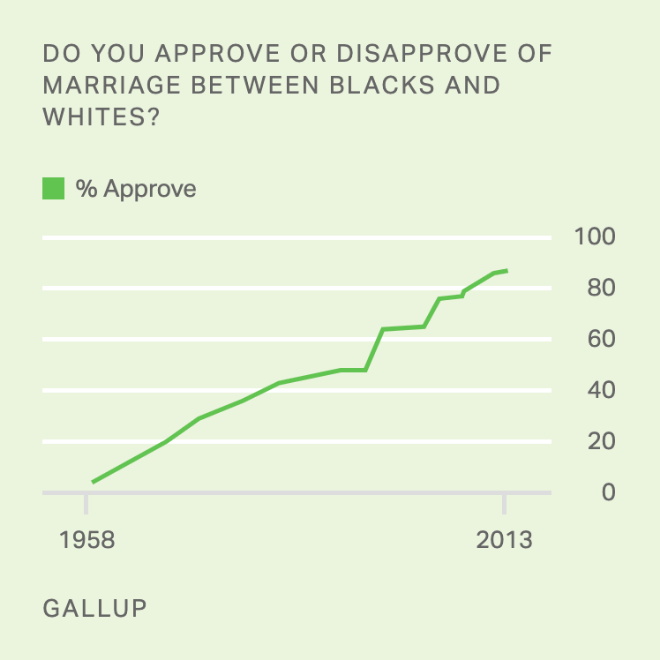
1992
1992
Acquittal of Rodney King's Attackers Draws Strong Public Disapproval
In 1992, riots erupted in Los Angeles after four White police officers were found not guilty in the beating of a young Black man, Rodney King. The vast majority of U.S. adults believed the verdict was unjustified. View related content about the Acquittal of Rodney King's Attackers Draws Strong Public Disapproval.
From what you know of the Rodney King case in California (in which Los Angeles policemen beat him), do you think the verdict finding the policemen not guilty was justified or not justified?
2008
2008
Barack Obama's Election Marks a Significant Shift in Americans' Attitudes Toward Black Candidates
Most Americans said they would not vote for a Black presidential candidate when Gallup first asked the question in 1958. But 50 years after that first poll, Americans elected Barack Obama, the first Black president of the United States. View related content about how Barack Obama's Election Marks a Significant Shift in Americans' Attitudes Toward Black Candidates.
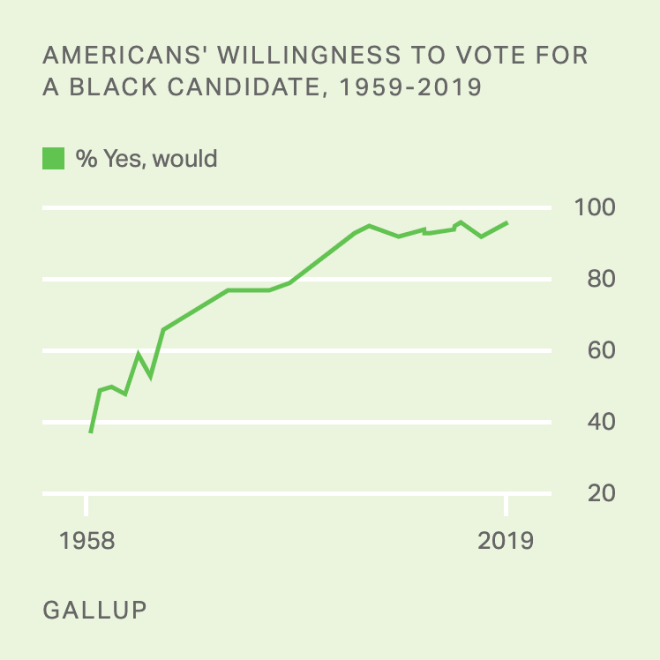
2020
2020
Race Relations Reemerge With a Prevalence Not Seen Since the 1960s
Nationwide protests were held after a Black Minneapolis man named George Floyd was killed by a police officer. In an open-ended question, about one in five Americans (19%) named race relations or racism as the most important problem facing the U.S. -- the highest Gallup recorded for this measure since 1968.
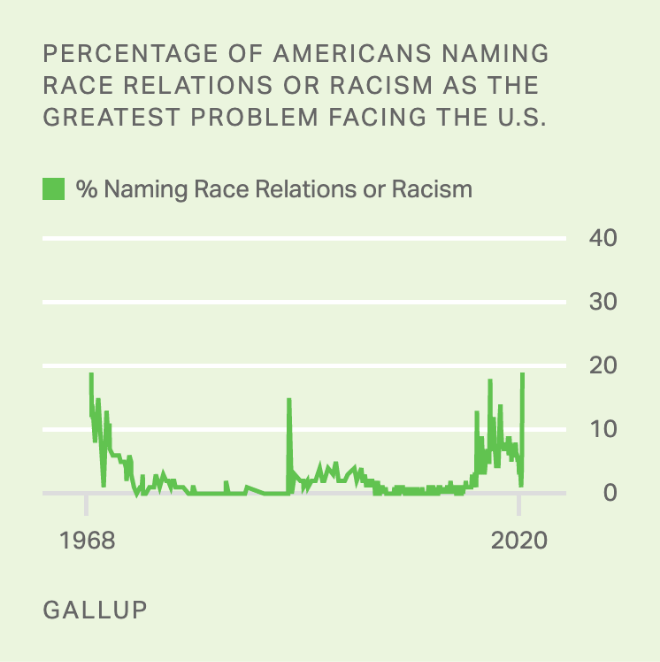
Our Mission
The Center on Black Voices is Gallup's research initiative devoted to studying and highlighting the experiences of more than 40 million Black Americans: tracking and reporting on progress on life outcomes and a life well-lived.
Read our chairman's blog about the initiative about how life is going for Black Americans.
Justice
Gallup will study the below concepts and metrics related to justice.
- Inequities in the processes by which law is created, implemented and enforced
- Racial disparities in representation of people and communities in federal, state and local government
- Racial bias and procedural fairness in the criminal justice system and cultural representations of crime and punishment
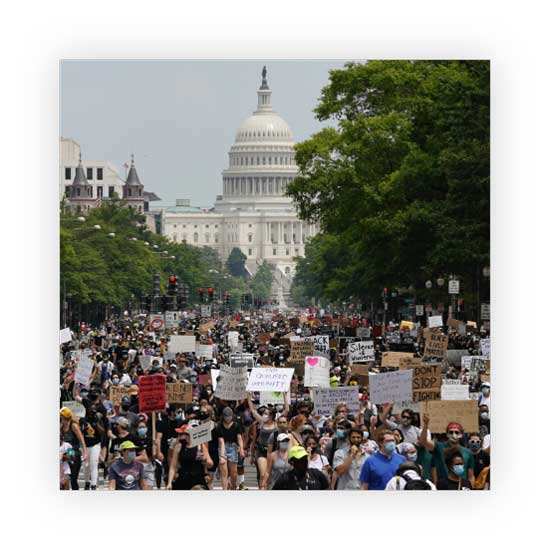
Health and Wellbeing
Gallup will study the below concepts and metrics related to health and wellbeing.
- The disparity in access to basic health and wellbeing needs
- The racial disparity in the quality of healthcare, including mental healthcare, maternal healthcare, preventative healthcare, and management of chronic disease
- The progress of Black Americans' physical health and wellbeing on indicators such as food security, life expectancy/mortality and morbidity
- Black Americans' wellbeing, life satisfaction and perceptions of opportunity for a life well-lived
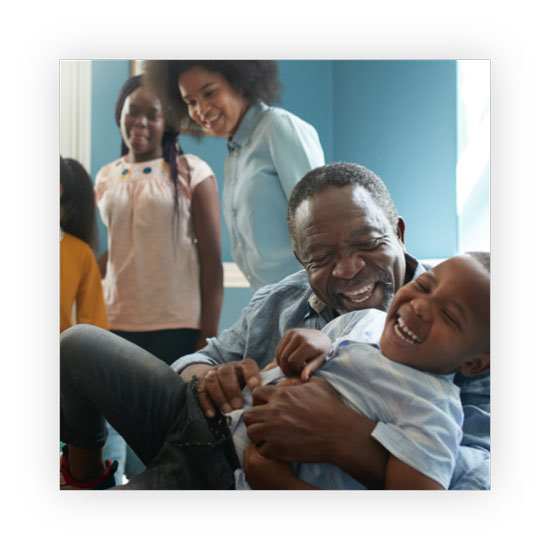
Economic Opportunity
Gallup will study the below concepts and metrics related to economic opportunity.
- Patterns of racial inequality in wealth and income, the fundamental causes of these gaps and how economic trends have exacerbated inequity throughout history
- Systemic bias in economic institutions, including systems of taxation, banking, lending and the financial impacts on Black Americans' daily lives
- Standards of living, intergenerational mobility in income, GDP per capita, consumer spending and other key economic indicators as a function of race
- How interactions among technological change, globalization, skill-demand shifts in the labor market and other major macroeconomic forces affect racial divides in economic conditions
- Black Americans' views of economic institutions and opportunity, potential for intergenerational mobility and resources for gaining financial literacy

Education
Gallup will study the below concepts and metrics related to education.
- Black Americans' experiences with pre-K, K-12 and higher education institutions
- Student engagement and perceptions of school climate
- Access to quality early childhood education that sets the stage for leading productive lives
- Racial disparities in access to quality schools and support for American students' academic achievement, retention and graduation, and college or career readiness
- Access to quality educators, coursework curriculum and educational support systems
- The variability in schools' support for behavioral, mental and physical health as well as the development of wellness and resilience
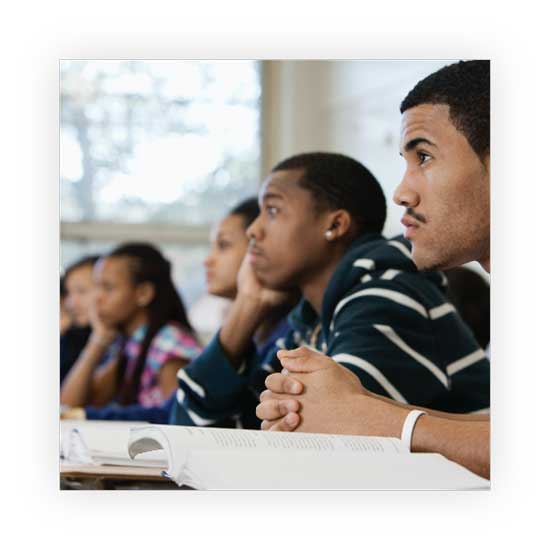
Jobs and Work
Gallup will study the below concepts and metrics related to jobs and work.
- Racial disparities in employment, including access to quality jobs and career paths, the development of job-relevant skills, and recruitment and selection practices
- The employee experience as a function of race and race relations to elucidate differences in opportunities for development and advancement, the application of organizational policies and procedures, and the daily experience of workplace culture
- Hidden systemic barriers that shape the experience of work and the workplace for Black Americans
- Patterns of opportunity and challenges in self-employment, entrepreneurship, and business ownership

Community and Environment
Gallup will study the below concepts and metrics related to community and environment.
- How variation in community resources create different opportunities for Americans to lead fulfilling lives
- Racial inequities in housing and community planning, transportation, and safety
- Creation and application of environmental protections and policies to reveal disproportionate impacts of climate change, natural disasters and land allocation
- How environmental conditions are tied to systemic racial inequities including pollution of air and water, exposure to chemical hazards, and access to natural resources
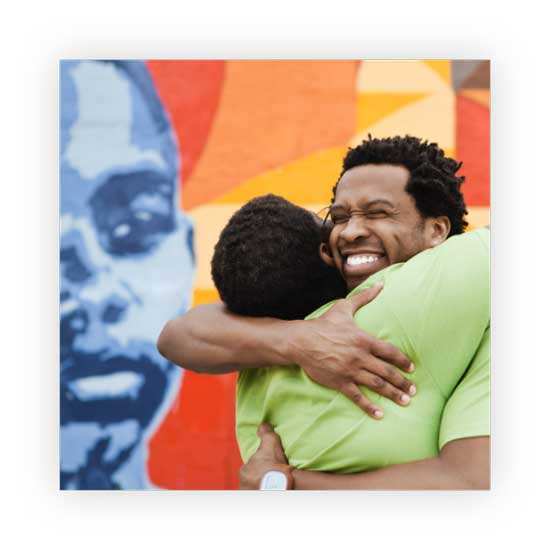
Center Leadership
The Gallup Center on Black Voices leadership team shapes Gallup's research agenda about the Black American experience. Our leadership team is uniquely equipped to shed light on the trends most affecting Black lives and design research-based partnerships to advance their experiences. Learn more about these experts and what they bring to the Center on Black Voices.
Cultural Competence Podcast
Partner With Gallup to Elevate Black Voices
The Gallup Center on Black Voices brings together community leaders and researchers to stimulate innovative thinking, spur partnerships and develop locally relevant models to amplify Black voices.
Partnerships in Action
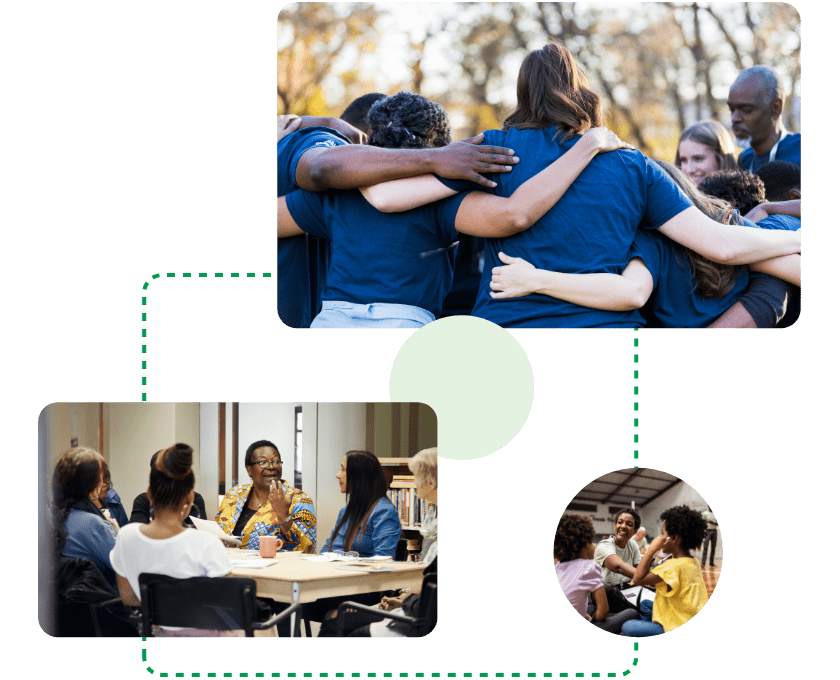
![]()
Detroit Regional Chamber
Beginning in 2022, Gallup partnered with the Detroit Regional Chamber to field a first-of-its-kind study exploring Detroiters' daily experiences and perceptions. The survey was designed to elevate issues central to Detroiters' quality of life, including their overall wellbeing and their ability to achieve equitable life outcomes. The insights from this research are now being used by public, private and philanthropic organizations across Detroit to better identify and close equity gaps.
![]()
Greater Washington Community Foundation
Since 2020, Gallup has supported the Greater Washington Community Foundation in amplifying residents' voices throughout the D.C. metropolitan area. The survey is fielded at regular intervals to keep a finger on the pulse of the community and track how residents are experiencing key quality-of-life indicators related to economic opportunity, wellbeing, safety, influence in democracy, and general perceptions of livability in the region. The Greater Washington Community Foundation relies on the findings from this study to prioritize which local issues to address and to help evaluate the impact of the programs it funds.
Learn how your organization can participate in this important work by contacting gcbvpartnerships@gallup.com.


